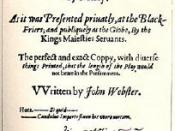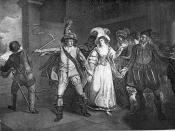In Webster's, The Duchess of Malfi, one scene connects thematically, imagistically, linguistically, and dramatically with the rest of the play. This is Act III, scene ii. In this scene, the author's scrupulous attention to the flow of text as well as the location of each scene, which serve dramatic purposes, become apparent. He also makes obvious the use of metaphors that are continually part of the text. During this scene, one of the main themes, the Duchess's desire to be in control, is very distinct for the first time.
The Duchess's need to have control over her life is epitomized in Act III, scene ii, when she is seductively teasing Antonio saying "I hope in time 'twil grow into a custom, that noblemen shall come with cap and knee to purchase a night's lodging of their wives." This stubborn approach to life is apparent throughout the text. In the beginning of the play, the Duchess stands up against her brother for her freedom to marry again stating that "...through
frights and threatenings [she] will assay this dangerous venture [remarrying]." Her impassioned desire to remarry is a shock in sixteenth and seventeenth century England where most widows simply remained single living off the wealth of their deceased husbands. The Duchess's willful nature is further demonstrated in Act I, scene iii in her comment "we are forced to woo because none dare woo us..." Although some may read the line as the Duchess's way of justifying her straightforward propositioning of Antonio, it could also be her way of commanding her life. The Duchess's tenacious nature is clearly illustrated in Act III scene ii, is a recurring theme and becomes even more apparent as the Duchess faces her executioners. She remains strong and unyielding declaring " I am Duchess of Malfi still."...



Good
An essay with good formating and good material.
0 out of 0 people found this comment useful.